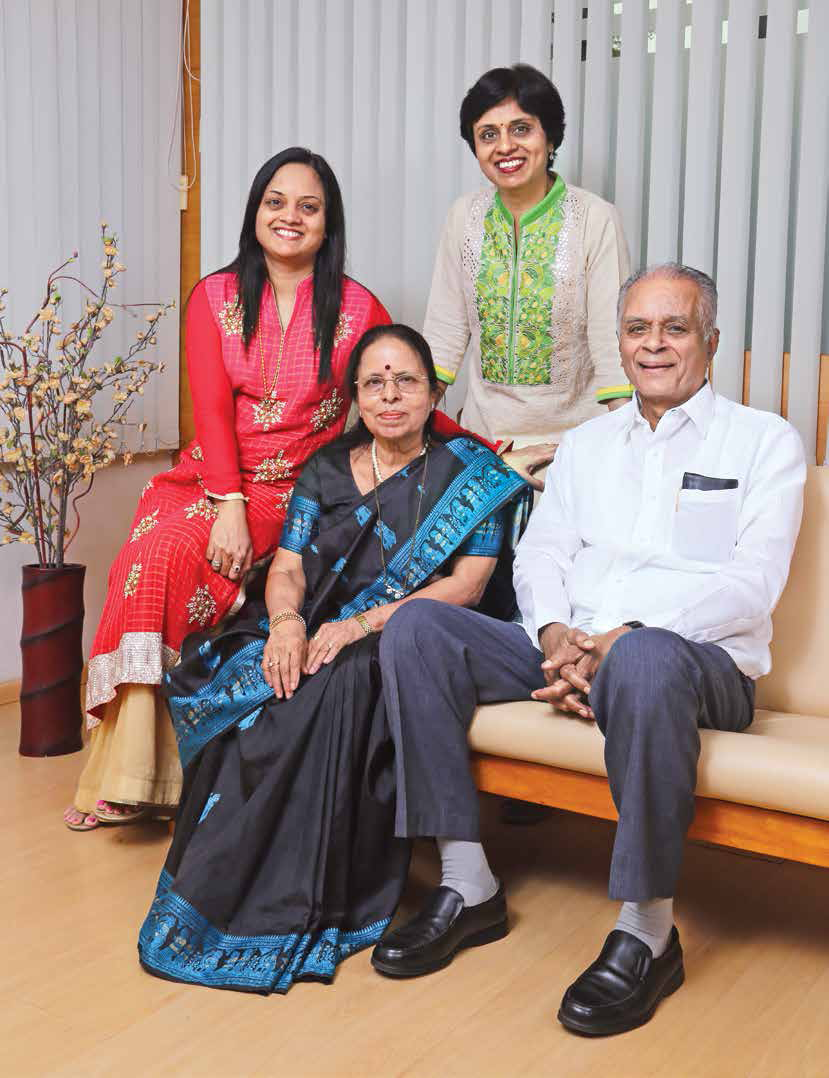
She is shy and unassuming. But there is no doubt about the silent but all-pervading role of Sanjeevani, Dr S B Mujumdar’s better half, in helping build the vast educational conglomerate that Symbiosis now is, be it through the sacrifice of her own personal goals, timely advice or physical support at all crucial junctures of the growth-trajectory of this vast temple of education.
Symbiosis and Dr S B Mujumdar are synonymous. With his two daughters, Vidya and Swati too at the helm of affairs of this esteemed educational conglomerate, the silent contribution of the strongest pillar of their support often goes unnoticed. That is, Sanjeevani Mujumdar, wife of Dr Mujumdar and mother of Vidya and Swati. Although by designation she is the honorary director of the Babasaheb Ambedkar Memorial and Museum, her voice is omnipresent in the management of the colossal educational organisation that comprises 44 institutes providing a variegated fare of courses, hosting around 30,000 Indian and foreign students in them at different locales.
Married now for 53 years, Dr Mujumdar, confesses, “Ninety percent credit goes to her for sustaining our marriage, as temperamentally, she is more balanced and very accommodative. She was brilliant in academics but sacrificed her PhD in order to look after the family.” Admiringly, he states, “Sanjeevani used to make at least 50 cups of tea every day for visitors who would come to our Fergusson College house when I was very active in University politics and was on the threshold of launching Symbiosis.”
States daughter Vidya, “Although my father is my idol, I always seek the advice of my mother first for any issue regarding Symbiosis, when I need help. She is the only one who tells me the truth about certain decisions that I may have taken. In order to give us good education, she sacrificed her doctoral degree and now that we are well settled, she devotes her time to the Ambedkar Memorial and is a professional to the core.’’
Adds younger daughter Swati, “My mother is a living example of patience, perseverance and positive attitude. She has all these qualities which have made her children succeed in their lives. Therefore I think all our success and also the success of Symbiosis is largely attributed to her upbringing, her presence, her guidance and most importantly her support.”
States Dr (Col) A Balasubramanian, President, Sri Balaji Scoiety and Editor-In-Chief, Corporate Citizen, “Mrs Mujumdar is the backbone of Symbiosis. She has helped many as a mother. She has always given a shoulder to anyone who goes to her and that includes me. During a critical time in my life, I lost all hope and contemplated leaving the world. It is she who called me at midnight and asked me not to take any wrong step and that she is around for me. She is very generous, homely and does not know what power means. She works silently and provides strength to her family as well as the Symbiosis family. She is a great thinker with excellent analytical capabilities. Whenever Dr Mujumdar faces any struggle she is his Senapati. She used to host several foreign students at home and those staying in the hostel would also go to her when hungry and she never disappointed them.’’
A shy and unassuming person, Sanjeevani Mujumdar, in this interview to Corporate Citizen hesitates to speak about her significant role in the success of Symbiosis, but reveals the selfless, hardworking and value-oriented life that she leads and providing the much needed cushion for the family which has reached great heights in the educational field. Excerpts from the interview:
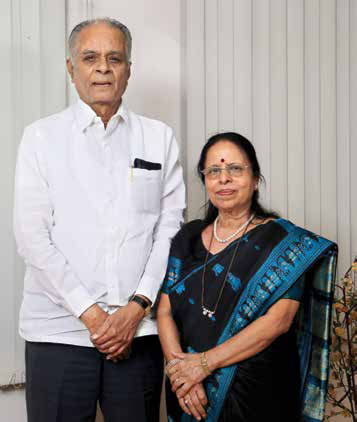
My childhood was spent in the company of students and colleagues of Padmabhushan Karmaveer Bhaurao Patil, the stalwart social educator from Kolhapur. He promoted mass education through his Satara based educational trust, Rayat Sikshan Sanstha. My father, being the Principal of its Training College as well as the Rector of its Remand Home, I spent my childhood in Satara.
I bear within me the deep influence of Karmaveer Bhaurao Patil’s ideology, of which I had a close view, as he used to sometimes stay in our house, for two month at a stretch. Thus, we never took factors like caste and religion into account. So much so, that we did not even have any knowledge about them. To give an example, most of the inmates of the Remand Home, had been abandoned by their parents - leave alone which religion they belonged to, their parents had not even given names to them. It was my father who named these orphans and decided which religion should be cited in their birth certificates.
Till I passed my matriculation examination (11th standard then), I was a student of Rukadi College which is eight kms from Kolhapur.
Shahu Maharaj donated this expansive campus to the Rayat Shikshan Sanstha. It was my father who established the high school as well as training college there.
Although my father was a graduate in Agriculture and took up a government job,he soon quit and joined the Rayat Shikshan Sanstha, which gave him a meagre salary. He never worked for the sake of money; he lived by principles and social values. These have remained ingrained in me. Hence, I am a believer of dignity of labour. For example, I do not feel ashamed to do any kind of work at home. I still cook myself and would not hesitate to do the laundry or cleaning of utensils.
"I bear within me the deep influence of Karmaveer Bhaurao Patil’s ideology, of which I had a close view, as he used to sometimes stay in our house, for two month at a stretch. Thus, we never took factors like caste and religion into account. So much so, that we did not even have any knowledge about them. To give an example, most of the inmates of the Remand Home, had been abandoned by their parents - leave alone which religion they belonged to, their parents had not even given names to them. It was my father who named these orphans and decided which religion should be cited in their birth certificates." -Sanjeevani
We are two sisters in the family. My elder sister was a Professor. She too returned to the Rayat Shikshan Sanstha after passing her M.Sc and served there till she retired.
My father raised us like sons. He never made us feel that being girls, we were different. He gave importance only to education and not to money or anything else. Even in those days, when women were rarely educated, my mother was a trained teacher. She had passed her Std VII and worked as a teacher with the Rayat Shikshan Sanstha. In those days, there was no age criteria for pursuing education and our home was in the campus. For me, it was like stepping out of my home and into my class. I was admitted straight into Std II, without attending Std I.
Later, Karmaveer Patil started the Science College at Satara in 1958. That was the year I passed my Matriculation and came to Satara. It was the first ever Science College there, and I was a student of the first batch. I lost the opportunity to get admission for the medical science course by two marks. So I decided to pursue B.Sc in Zoology.
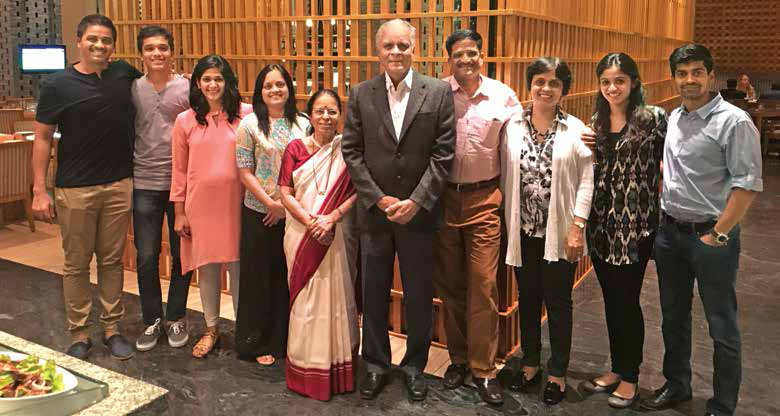
Mujumdar Sir joined the college as a lecturer when I was in the last year of B.Sc. That was his first job too. Initially he was recruited as a demonstrator and then became a lecturer. We came to know him as a studious man and a good teacher.
Being the first batch, there were hardly 10-12 students. As part of the course, Mujumdar Sir took us to Mahabaleshwar on a study trip. We students were all good friends, so we paid more attention to sightseeing than the academic part of it. In the evening he decided to test our knowledge. He said, “You have spent your parents’ money to come here. Each one of you should tell me the botanical names of 25 species that you have seen today. You have been here for the last two days and now it is time to check what you have learnt.” My sister Vijaya and I could easily recount the 25 names. Others were taken aback. He reprimanded them and said he would be asking them the same the next day. Both of us made the others recite the names throughout the night fearing his wrath, and by the next morning, they had learnt them by heart. That was the first time we realised that it was our prime duty to concentrate on our studies.
Dr Mujumdar himself was quite studious. He never gave a single lecture without making elaborate preparations. He was a class apart. Thanks to him, we never needed any coaching class or reference notes. I passed B.Sc. with good marks and immediately got admission for M.Sc. at the University of Pune. My father desired that both we sisters pursue M.Sc. and so both of us came to Pune.
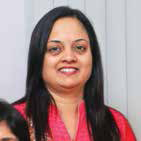
We were in love with each other when I was doing my B.Sc. It was his brilliance that attracted me towards him. He lived close to our house. A very conservative atmosphere prevailed then. One evening he proposed to me,asking me whether I would marry him. I told him that I would consult my parents and we would proceed if they consented to the proposal. He too was very clear that we must have the consent of both our parents. After all, he was a Saraswat Brahmin and I was a Maratha. Five decades back, love marriages were frowned upon and if they were inter-caste, it was even worse.
When I told my parents, they said they would think over it for a couple of days before giving their decision. After about four days, my father summoned us and gave us his consent.
Most importantly, my mother was a very courageous woman. She read the Dnyaneshwari and was God-fearing. But she was educated and that made a lot of difference. All my father’s relatives came to attend my sister’s wedding which was held at our native village Rethare, near Karad. My father’s brothers and my cousins lived in that village. My mother bravely summoned them all and told them without mincing any words that her younger daughter (I) had found a groom for herself and they had given their consent to the alliance. Now it was up to them, whether they wanted to continue relations with us, henceforth. Many of them were taken aback. So much so that my cousins were not in talking terms with me for several years. They felt disgraced that I should have married out of caste.
I was convinced that he was in love with me, when, during the long Christmas vacation, he suddenly returned from home. We were puzzled.We thought he’s come back because he is studious-minded. However, my intuition told me that it had something to do with his feelings for me.
Soon, he got transferred to Shrirampur and I went to Pune for my post-graduation. Thereafter,we kept in touch through letters.
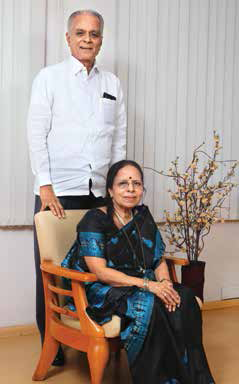
My father made the mistake of going to his (Dr Mujumdar’s) native village to seek the consent of his father. My mother in law was against the marriage. He returned from there dejected. But both of us had resolved that we would not cause any trouble to our parents and we would get married when we desired to. I was in the first year of M.Sc. when we decided to get married during the Diwali vacations that year in 1959. We did not look for an auspicious day and we got the wedding cards printed with our own names, as hosts.
We decided to spend our own money on the marriage instead of taking money from anyone else. His father was a lawyer and his family was well off. My father too was the Principal of a College. But we did not want anything from anyone. We wanted to be on our own. Therefore, we went to Panhala with a few friends and got married. My parents, my maternal aunt and sister were also present besides a couple of friends. The total number of people attending the wedding was around 20. The expenditure came to about Rs.1, 000. We borrowed money from his friends and repaid them later,in instalments of Rs.25 or Rs.30. At that time, he was working as a lecturer at Gokhale College in Kolhapur, where the salaries of staffers were not given on time. Nevertheless, we had resolved to be self-reliant. He said once we got married, he would shoulder my responsibility. Until we got married, my father would give me pocket money, as we were living in the hostel. But Dr Mujumdar insisted that I should not take money from my father after we got married. Instead, he would send me money. Actually, he was struggling to meet both ends but yet he did not burden my father.
Later in the second year of M.Sc, he got a job in Fergusson College and we were allotted a house in the premises.
He worked with Fergusson College from 1963 to 1982 as Professor of Botany, and he was also the Rector of the Boys’ Hostel. I passed my M.Sc. in 1964 and won a UGC scholarship. I got three opportunities – as a lecturer at Fergusson College, or as a Research Assistant with the University of Pune and a scholarship for Ph.D. Vidya was five months old then. I went to meet Leela Mulherkar who was then the head of the Zoology department and a PhD guide. I told her, “Madam do you rightfully feel that I should pursue higher studies? I too feel the same way but what about my child? Who will look after her?”
She said, “since you are getting the UGC scholarship, you should opt for Ph.D. That way you and your husband can adjust timings with each other.”
Fortunately, my maternal grandfather found a baby sitter for me; she was a very pious, elderly woman from Karad. Since my subject was Zoology, I needed to do research in the university’s laboratory. That would take five to six hours. I would go in the morning and return home at lunch time. I would then cook, have lunch, feed Vidya and go back to the laboratory again. PMT buses would be available at one hour frequencies. I would return home by 6 p m.
The story of the Mauritian student who fell ill and was attended to by his girlfriend who passed on food through the window of his hostel room is well known. When Dr Mujumdar went to see him, he felt he should do something about the foreign students who came to study here. Then he started interviewing foreign students in Pune, which the Kesari newspaper would publish every Sunday. V.S. Walimbe was the editor then. Dr. Mujumdar’s objective was to study the problems faced by the foreign students. He continued conducting interviews of foreign students from different institutes like the Film and Television Institute of India, Wadia College, Fergusson College and so on, for a year. This gave him a deep insight into the different situations they had to face during their sojourn here.
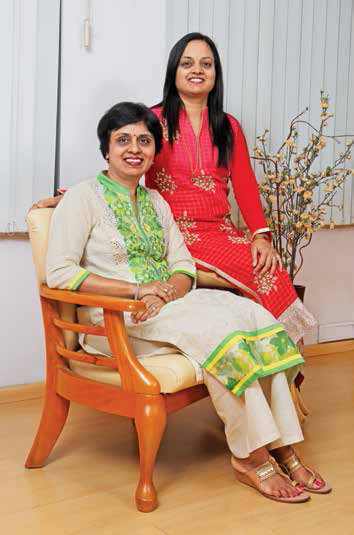
Several foreign students have lived at our Fergusson College house. Let me give an example. There was an American student, John Owens. He had come in 1971-72. Symbiosis had just been formed then. In fact, he had been provided accommodation in a bungalow in the vicinity of the college. At that time, Dr Mujumdar was a Foreign Student Advisor at Pune University. So every new foreign student would meet him. John fell ill within a few days of coming here.He had high fever, so he came to our house to meet Dr Mujumdar. Since he had to go for a lecture, he asked me to take him to our family doctor. We went to the doctor in a rickshaw and returned home. At that time, Dr. Mujumdar’s elder brother who was a judge, was posted in Pune and stayed with us with his wife, three children and my mother in law. Now, this American student insisted that he wanted to live in our house and did not want to go back to the bungalow, where he said he could sense that the women were not happy with his presence.
I told him, “John, if you wish you can live here in this living room. I cannot provide you a bedroom.” He said it would be fine with him. He agreed and stayed for several months with us. He went back to USA after his education. Before that, we got him married to a Maharashtrian girl. He has two sons and he has given them Indian names – Devendra and Siddhartha. He has retired now, and is still in touch with us.
There was another student who lived with us by the name of Kawas Behroji.He was an Iranian - many Iranian students studied in Pune in 1973-74. He arrived in Pune and a couple of days later went to the Camp area with other students, where his wallet was stolen. So, he came to our house. Then the fees at ELTIS (English Language Teaching Institute) were Rs.300. He had paid it, but came to ask for a refund as he had become totally penniless. He wanted to return to Iran. We thought over it. Dr Mujumdar said, ‘Let him stay with us in our house. We will provide him accommodation and inform his parents.’ Then there were no mobiles then. We sent a letter to his parents and informed them about the incident. Then his father sent money. He too lived in our house for six months and felt great about it. We almost became his foster parents. He would help me in cooking and sometimes make Iranian dishes like kebabs. He studied in Wadia College and Symbiosis and returned to his country after completing his graduation. Many Iranian students studying in Fergusson College would come to our house in the afternoons during examination time saying, ‘Vahini feed us something.’ They would eat chapati with vegetables and return to their classes. We did not like to send anyone hungry from our house.
“One evening he proposed to me. I told him that I would consult my parents; he too believed that consent of both parents should be sought as we were from different communities— Sanjeevani
Symbiosis started in 1971, but till 1976-77 the office was at our house in Fergusson College. When Dr Mujumdar decided to start the Symbiosis Trust, he had four friends with him - two of them were his students – Satish Chiwale and Anil Dandekar. Then there was Sudhakar Bhosale and James Ramlal, a foreign student who was pursuing his PhD and would visit us often. It was mandatory to have seven trustees, he could gather six. Then, Dr Mujumdar told me, “I’ll give your name too, and you too become a founder member.” That was how my name got attached to it.
Dr Mujumdar thought of that name because it is a botanical name. It is his creation. I only helped him as a duty-bound wife. He decided to start a law college first. The ILS Law College had been established in 1924 or 1927. There was no other law college, so he thought if a law college was started it would do well. There would be morning and evening batches to facilitate working professionals too, who wished to pursue the course. We had a very good response, with 1200 students joining the course in the very first year. The faculty was also good. Justice B M Deshmukh, former Chief Justice of Maharashtra was the then chairman. Several top notch law professionals like B G Kolse Patil and Mohite were among the faculty.
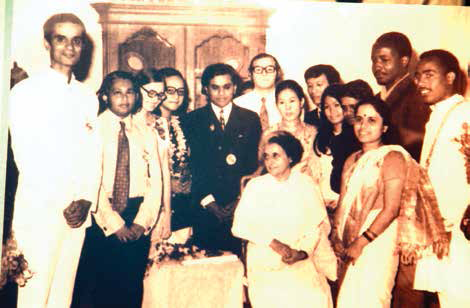
Mai Ambedkar gave us these exhibits in 1982. Actually, she wanted to set up a museum in Delhi. She met Indira Gandhi as well as the then chief minister of Maharashtra, A M Antulay on several occasions, but did not get any response from them. At that time, my brother-in-law was posted in Thane and a lawyer there by the name of Mr Thakur, was related to Mai. Once, she met my brother-in-law and told him that she had to vacate the flat in Delhi and she didn’t know where to keep the articles that were used by Dr Ambedkar during his lifetime. She mentioned that she wanted to keep them in a museum. He said he would be happy to set up a museum and took the initiative. He brought the articles and kept them here in our house.
Later in 1990, we were allotted land for the museum from the state government. We put up a signboard to indicate the venue of the proposed museum. There was a lot of opposition from the media and from some political parties. Dr Mujumdar made me the honorary director of the museum as he thought that I had the capacity to withstand the hue and cry and work towards it. He told me, let people say what they want; we should continue our work. Therefore I started looking after that project on the two acre land. It started work in 1990, when it was just a garbage dump. Now this has become a tourist spot in Pune.
Dr Mujumdar felt that Dr Babasaheb Ambedkar’s museum would not be complete unless it had a library. Thanks to central government funding, we could renovate the museum and construct the library building. We also have a study centre in it where 800 students study. The fees are a nominal Rs.300 per month. You would be surprised to know that candidates appearing for UPSC, MPSC, banking and other competitive examinations come here and study well and quietly. They queue up from 6.45 am, waiting for the study centre to open its gates.
As for the museum, we have the maximum number of articles of Babasaheb in India, right from his Bharat Ratna Award to his death bed, dining table, chairs – totally, we have 278 articles and his 490 books which he used himself and jotted notes on. We have set up a conservation laboratory as we need to do conservation work to maintain these articles.
After all, the museum needs to be self-sufficient. How much money can we take from Symbiosis? I work on an honorary basis but others get salaries. Once, while coming here I noticed a tempo standing near the SIBM building and a man was taking flower pots out of it. I asked him what was he doing and he said he was providing flower pots to the SIBM on a monthly rental basis. When asked how much he charged, he said Rs.60 per month. Then I thought, if we start growing such flower pots in our museum premises and provide them at Rs.40 instead of Rs.60, then the museum would also get some revenue. Today, we provide flower pots to all Symbiosis institutes and get rent for them.
I believe in God. After both of us decided that we would not take financialhelp from anyone since the time of our marriage, we have never looked back. When we came from Kolhapur to Pune, we literally brought our luggage in two wooden cartons which included two aluminium pots and a stove. Even today we live a simple life. We have worked hard and our daughters work hard. Now, our grandchildren are also dedicated to Symbiosis. Because of the values we have inculcated in them, they too feel they should work devotedly. There are no considerations of money in it.
Even today, Dr Mujumdar stays put in Symbiosis throughout the day .During the nights he is busy with something or the other, often spending his time in reading till 2 am That is his level of dedication to Symbiosis.If a new institute is to be opened, he studies what course will do well, what is the need of the hour and for whom. Now, when skill development has become the keyword, he has promptly set up a skill development university at Indore. There is no doubt about his studious nature and intelligence. He also has vision. And he is totally selfless. He lives a simple life. Even today we eat Pithla Bhakari at home. He has no attraction for food from five star hotels. Even his clothes are selected by me. He is always engrossed in thought as to what new can be introduced. The Symbiosis is the outcome of all this. I have no claim to stake any credit in it.
To be frank, he never paid attention towards home keeping or running the house. He was totally devoted to Symbiosis. Even today if you ask him the going market rate of commodities, he would not be able to answer.
Firstly, when we had daughters, people said since ours is an inter-caste marriage, the future of our daughters would be bleak. People do speak and we have to hear it. You know how it was in those days. I always believed, be it a daughter or son, the child should study well and make it big on his/her own. Therefore, the first decision I took was to enrol them in an English medium school. I did not want them to face the problems I faced. We were really brilliant in academics, but when it came to conversational skills, we lagged behind. I enrolled both of them at St.Joseph’s School.Others would tell me that their children made it big despite being students of municipality run schools. Dr Mujumdar Sir did not thrust anything on me; he gave me freedom to do whatever I wanted to. Therefore, our daughters got good education, initially at St. Joseph’s and then at Fergusson College. Vidya then joined B J Medical College and Swati did her B C S and went to the US for her post-graduation.
My mother is a big pillar of support and strength for our entire family. i think it is only because of her that we have come this far as children. she has always been there as an epitome of strength and courage, no matter what the situation. in fact, at every event of our and our children’s lives, whether big or small, she has always been present. not only us, but her grand-children too are so attached to her, that they call her ‘aai’ (mother). This word also symbolises a mother. she has the great ability to bind people and keep the family together. she is also a living example of patience, perseverance and a positive attitude. she has all these qualities which have made her children succeed in their lives. Therefore i think all success and also the success of symbiosis can be largely attributed to her upbringing, her presence, her guidance and most importantly her support
Both spouses must be like-minded and have common goals to achieve.The rest is inconsequential. Petty factors like whether I got a Rs.10,000 worth saree or not become negligible. What is of importance is, what are you going to leave behind you.
I am a proud mother. Even my grandchildren are achievers. It feels good to be assured that our children will continue what we started. Some 15-20 years back, when both our daughters were abroad, we would feel anxious as to what would happen to this institute in the future? Would we get good people to run it? What would happen if it goes into the wrong hands? But we no longer have any such apprehension.
No. Just the two of us have never gone on an outing together. We like to be in the midst of people.However, we have our holidays with our children and grandchildren.Besides, I call up both my daughters and my grandchildren every day.We are totally involved with them. Recently, we had been to Goa to pay obeisance to our family deity. And if we do not meet for a week, we all go out for lunch or dinner together.
I feel we have been blessed in this life, so we must do whatever we can. We do not know if we are going to get another chance with life.
Despite belonging to different castes in an era when society was too conservative to accept such marriages, Dr Mujumdar and Sanjeevani tied the knot without parental support. Both believe that if each has a goal to achieve, petty reasons for disharmony in marriage do not rise at all. Dr Mujumdar gives an insight into how he met his future life partner and how successfully their marriage rolled through the 53 years.
When I did my M.Sc. I stood first in the university. At that time, UGC used to give research scholarships of Rs.250 per month to students who intended to do their PhD. My name was recommended by the head of department, but the Registrar changed his mind overnight and gave the scholarship to some lady who had very ordinary academic credentials. This was 14th August 1960.I had to spend a year without a job because all colleges had started by then,all posts filled, not even a Demonstrator’s post was available. I had to go back to my native place, and suffer humiliation.
My father was a very prosperous advocate and he got taunted that his son was jobless. That was a frustration point for me. I scrambled for money. My father kept Rs.2000 in my account, but never asked how I spent it. He understood my state of mind.
I started drinking and gambling and got into bad company. A year later, I applied at various colleges and got the first interview call from Rayat Shikshan Sanstha. Later on I got calls from other colleges, but I had decided I would join the college that invited me first. That is how I joined the Rayat Shikshan Sansthain Satara as demonstrator-cum-lecturer.
I used to study five to six hours to prepare for one lecture. Very soon, I became very popular. Students from other local colleges too started attending my lectures. I found one girl taking a lot of interest in my teaching. She was intelligent, very sincere and when we used to convene our botanical excursions, she used to take keen interest in me and the tour itinerary. She was Sanjeevani.That started our contact.
We found that I liked her and she liked me, but we came from different castes. She belonged to the Maratha community, I belonged to the Saraswat community. There was opposition, particularly from my family and also hers, to a certain extent. I decided, ‘Okay, if this is the case, I will marry this girl only when I am not in Rayat Shikshan Sanstha.’ Her father was a life member of the Sanstha and therefore influential, so he had me transferred to Shrirampur so as to disconnect me and my proposed wife. I felt that was unjust, but I swallowed it. Since this college too came under the Rayat Shikshan Sanstha, I applied elsewhere. I got the job of Assistant Professor, Gokhale College, Kolhapur. That’s when we decided to marry, but without anybody’s support.
When she was studying M.Sc. Zoology my father-in-law used to send Rs.250 per month to her. No sooner did we marry, he stopped sending the money which was another slap on my face. I said ‘Okay. This plight will also change.’ After nine months at Gokhale College I saw an advertisement for a Professor’s post in Fergusson College. But accommodation was very expensive in Pune and the college did not have any of its own, I did not take up the job... A year and a half later, I received a letter from Principal Kogekar of Fergusson College saying he had persuaded the resident rector who had retired, to vacate the premises and so he can provide me accommodation too. My wife was doing her second year M.Sc, and staying at a hostel in Pune, so I coming to Pune was another attraction for me.
When Vidya was born, she was doing her PhD under Dr. Mrs. Mulherkar, head of the Zoology department. After some time it became difficult for her to manage home which had my brother and his family, my widowed sister and her family, my mother, and foreign students who came off and on - all staying with us. So she declined the research fellowship, for the family’s sake.
I desired to pursue my doctorate but when I was denied the PhD scholarship, I started taking interest in university politics. I contested the senate elections, got elected as the professors’ representative,and contested the executive council elections. Then in 1969, during the Diwali vacations I witnessed the trauma faced by the young Mauritian boy when he fell sick at the hostel. I decided to form the Symbiosis Society, with its office in my bungalow.
That was when I told my wife, who I address as Sanja, that I would devote my time to teaching, my university politics and to Symbiosis. From that day she single-handedly managed the home affairs.
Everyday my wife used to prepare not less than 50 cups of tea for visitors while I was in the academic and executive council, and visitors came from both within and outside Pune. It was like dabbling in politics.
Then, Swati was born. My brother had got a promotion, so he left. My sister’s family got their own accommodation. By that time I resigned from my post in Fergusson College. I also resigned from all positions in the University and became full time director of Symbiosis. That was in 1980. Imagine,Symbiosis was established in 1971, from 1971 to 1980, I worked as a professor at Fergusson College as well as for Symbiosis.
Her total devotion to her work. And attitude towards the family. To be very honest, I know nothing about finance, but she is very sharp. She is very simple, has no airs. She doesn’t like publicity. She likes her work, her house and she is happy. If you ask me what attracted me to her or her to me, there are no answers. A moment comes when it clicks. Later on the families also got reconciled. They love you and forgive you once they love the grandchild.
Temperamentally she is more balanced than I am, that is required in marriage. If both are short tempered or hot tempered, the marriage won’t last.
The husband and wife should live a symbiotic life, there has to be give and take.‘Symbiosis’ is not just a biological term. It is the basis and foundation of life.
My mother has been a pillar of support for all of us; she is there for us at a personal level and for Symbiosis at a professional level. Of course she is a great support for my father, but mainly for the whole organisation. She has been a quiet worker for so many years.
When Dada started Symbiosis, she was obviously one of the founding members, but she never ignored the family, almost till my children grew up. She played a sacrificing role like all mothers ideally do. Though she was highly educated and had almost completed her PhD, she sacrificed that too when both Swati, my sister, and I started going to school. Otherwise she would have completed her PhD and probably been a professor somewhere. But she gave up her own ambition for the family. Probably she had the vision that what Dada had created as Symbiosis would become so big, and someone would need to be at home to take care of us. But now of course, she is a professional and manages Symbiosis Society's Dr.Babasaheb Ambedkar Museum and Memorial, and the Afro-Asian Cultural Museum. She works very hard and always comes up with new ideas.
I was a member of University Grant Commission (UGC) for six years.Whenever I went to Delhi, I never travelled alone and would always have Aai (my mother) or someone else travelling with me. Most of the time, because my children were at college, Rajiv would be home when I travelled, and Aai would come with me to Delhi. As a UGC member, I would have a hotel to stay in and a car at my disposal. Aai could have easily gone around Delhi shopping, as any other woman would do. Instead, she found out that the Ministry of Culture was located in Shastri Bhawan and visited it. She inquired what this ministry did, whether it provided funding to museums set up by private organisations, and so on. She did not meet the minister, though there was easy access.
I remember when once she went to meet a deputy secretary of Minstry of Culture and said she was from Symbiosis, he told her, he knows Mujumdar Sir of Symbiosis and asked her what work she did there. She said she was his wife. The person couldn’t imagine that his wife was a simple lady like her,and that she came to his desk just to inquire. By simply visiting and inquiring at the ministry office, she got a grant of over Rs.4crore for the Ambedkar Museum. People who are quiet like her can do a lot. Apart from that, she takes care of the education of all our employees. Those who have not even passed their tenth standard, she gets them enrolled into these open schools and the Yashwantrao Chavan Mukta Vidyapeeth. Many of them have now graduated, so she has done great service. Initially she gave her life for the family, and now she is doing so much for Symbiosis.
When I came back from abroad, my children were still young and going to school. I had my medical practice and then I joined Symbiosis. My mother would take care of my children and has almost totally reared them herself. Apart from taking care of them, she has also instilled the right culture and values in them, which I feel as a working mother I wouldn’t have been able to.
All that I am today is because of her - though my father is my idol, if my mother had not provided me that platform and support, I probably would not have been able to do what I am doing today.
“All that I am today is because of her – though my father is my idol, if my mother had not provided me that platform and support, I probably would not have been able to do what I am doing today”
She has been part of every important decision of Symbiosis. She is the one person who can tell you, ‘Don’t do this’. When you are going up the ladder and you are at a certain position, there are very few people who will actually tell you that there is something wrong in what you are doing, and you should not be doing it. Apart from that, when I am in Delhi on Symbiosis related work and if I feel there is some failure, or something I don’t know about, or things don’t happen the way you want them to because there is bureaucracy and there is a system you have to work with, the first thing I do is call her, asking her advice as to what I should do. You need such people in the family who are supportive.
The way she has evolved as a person, from her role as a mother and grandmother and now to a professional at this age is amazing. No one would do this at her seventy-plus age. She is a very simple lady, her needs are very less. At her age, she is very punctual about her food, exercise and health. I pray to God, who has given both my parents excellent health, to continue to do that.
By Vinita Deshmuk